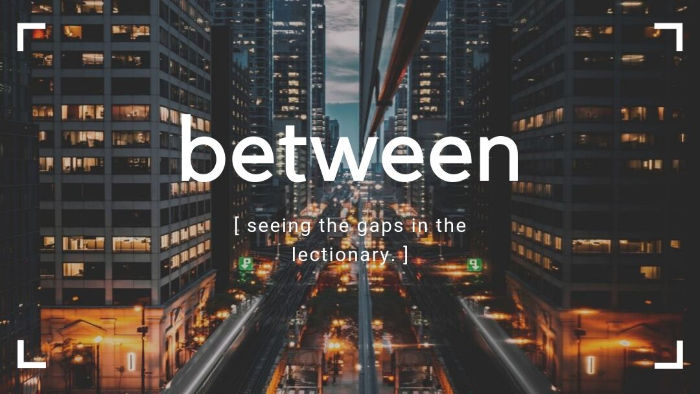
A look at the gaps in the lectionary.
This week: the gap between Easter 5 and 6
The text: John 14
This week’s gospel runs straight out of last week’s. Which means there is no gap in the lectionary.
What I’ll invite us to think about this week, as we prepare for Sunday, is what led to last week’s gospel and how that situates us now.
Confrontation
This passage arises out of confrontation. A confrontation that rises nearly to the level of persecution.
Jesus is being plotted against by the Temple leadership. They are seeking to destroy him and his message. And Jesus’s response to that that plotting is to confront it.
And, as I’ve noted before, there is a strange feeling that we may feel in reading this. That Jesus isn’t being gracious enough. Or careful enough. That he drives half of his followers away. A response that is shockingly familiar to those in pastoral leadership.
We also have a gospel that presents this confrontation entirely differently in John than the synoptics. Because here, Jesus pushes away the crowds who do support him at the triumphal entry. It is possible that these people become disillusioned and condemn him at the Passion—which is not at all how it is portrayed in the other gospels.
Two-Fold Betrayal
In John 13, we have two moments of betrayal—moments which reverberate with the concept of confrontation.
At the Last Supper, Jesus announces that he will be betrayed by one of them and essentially reveals to everybody that it will be Judas. Who helps that accusation by running away and doing precisely that.
Then, Jesus teaches them the “new” commandment of love. And tells Peter that he will deny him three times. To which Peter obviously scoffs.
While everybody loves to cast Judas in the role of evil betrayer of the cause, gleefully rejoicing at his suicide in Matthew (which is, by the way, not actually a sign of love representative of that new commandment), we never do the same with Peter.
Jesus’s prediction of Judas’s betrayal and then Peter’s denial both serve a kind of purpose, however. Both for the narrative and for our understanding. It would be closer to the truth if we acknowledged Peter’s three-fold acts as a betrayal in the same way that Judas’s was. It facilitates the precise outcome we get while fundamentally betraying the cause.
We, like Jesus, may be far more eager to forgive Peter in the end. But it is ultimately unwise for us to consider it as being of a different substance (as actions go) from what Judas has done.
Literalism and Comfort
As we explored in last Sunday’s sermon, the challenge in John 14:1-14 is:
- We are likely to read Jesus as literally as Thomas and Philip do, but with the added burden of knowing better.
- We often reserve the comfort Jesus offers for times of death.
But the teaching Jesus is offering is a comfort in knowing Jesus now. Not later. And the certainty that comes with direction and purpose, not in knowing what will happen.
This is the context we enter into when we address the idea of Jesus’s responsiveness to our need.
We probably still have the shepherd’s voice in our minds. And the comforting preparer of The Way. Now we are being introduced to the Advocate—which we know as the Holy Spirit.
A promise that continues the assurance.
A Little More About Love
Without the love commandment in John 13, love might seem like a golden ticket for insiders here. Jesus has just told them that they are commanded to love. And that this loving is how they will be known in their communities. As we might now say “an outward and visible sign of an inward and spiritual grace.”
In other words, their love will be sacramental.
Speaking of love in relationship to being known by the Father without that context feels very afterlifey. It also has a bit of strident ingroupness to it. A way of saying “We’re the good ones.” Which runs far afield of what Jesus seems to be getting at.
I also have a hard time reading this in such a prescriptive way about a Christian in-group of true believers given the context I’ve already laid out.
Love seems to involve forgiving Peter. And if Peter, then why not Judas?
Similarly, assurance based on love, of hearing the shepherd’s voice and knowing the way to go, implies our own lostness and need to be forgiven.
The struggle we have, entering into this particular gospel, is to recognize just how much context can reshape our vision of it.
